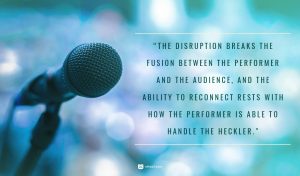Recently, I got to watch comedian Dave Chappelle perform stand up as he embarks on his nationwide comedy tour. As I walked through the theater and to my seats, I saw hundreds of signs taped up around the space with a warning: No Cell Phones. No Heckling. A D.J. and the opening act both reinforced the house rules before Chappelle walked on stage. But sure enough, about 1/3 of the way through his routine, an audience member yelled at him. That audience member was promptly roasted by Chappelle and escorted by security out the building.
Psychologist Pamela Rutledge said in an interview with NPR that hecklers may just want attention or power over the presenter, or they may feel entitled to speak their opinion. But it is up the presenter to handle the heckler.

“The disruption breaks the fusion between the performer and the audience, and the ability to reconnect rests with how the performer is able to handle the heckler.”
How does a professional presenter handle an awkward situation when an audience member distracts them? Here are some guidelines for how to carry on and *not* lose your cool during a presentation.
Plan Ahead:
Even though the signs and verbal warnings were not enough to prevent a heckler at Chappelle’s performance, odds are they will work for your event. Large crowds may be harder to control, but if you are speaking to a smaller group, make your intention clear that you deserve their undivided attention throughout the presentation. After all, the signs and verbal warnings worked for me as I watched Dave Chappelle perform.
Lay Down the Law:
If you are speaking about a topic of debate (like political views, religious beliefs, or any subject that could bring about a defensive response), make it clear that you more than anyone else understands that there are differences of opinions, and you are open to them. Start off your presentation by stating, “I know many of you feel passionately about this subject, and I want to hear your ideas. Please hold off on your comments until after my presentation, when we can have a discussion.” This shows you are in charge as long as you are speaking, but also opens the door to audience participation.
Address The Situation:
Maybe someone shouted out their opinion or is quick to put in their two cents after every presentation point you make. The best way to handle these outspoken individuals is to acknowledge them and thank them for their feedback. But go back to laying down the law and repeat your rule that questions and comments will be taken after your presentation is over. Disruptive audience members can be ignored, but a heckler need to be told that their comments need to be kept to themselves throughout your presentation.
Keep these rules in mind the next time someone tries to throw you off your game during your next presentation.
Related Posts:
Diagnosing a Distracted Audience